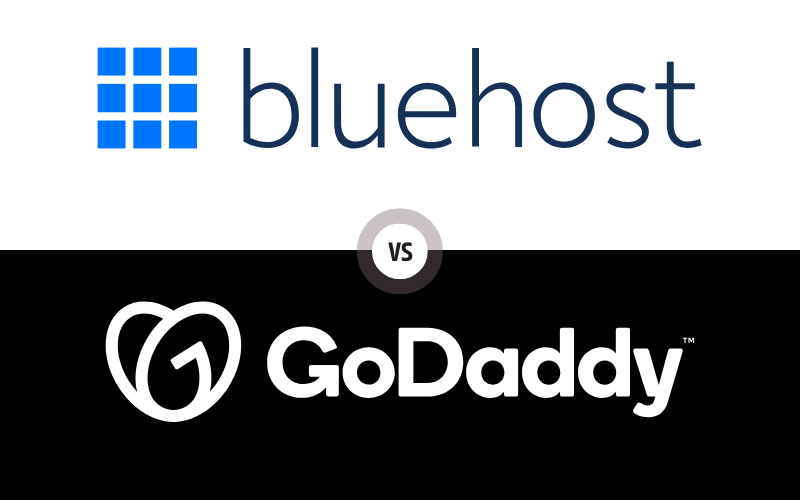When it comes to web hosting, Bluehost vs GoDaddy is often the first comparison that comes to mind. These two hosting giants are some of the most popular options, trusted by millions of users worldwide. But how do they compare, and which one is the better fit for your website?
Whether you’re building a blog, launching an e-commerce store, or managing a business website, your choice of hosting provider can greatly impact your site’s performance, security, and growth potential. Bluehost is celebrated for its WordPress-specific features and robust plans, while GoDaddy offers an all-in-one solution with excellent domain management tools.
In this blog, we’ll break down the key differences between Bluehost vs GoDaddy, including their performance, pricing, features, and scalability. By the end, you’ll have the insights needed to choose the right provider for your goals.
Let’s dive in!
Table of Contents
Performance and Speed: Bluehost vs GoDaddy

When it comes to web hosting, performance and speed are at the top of everyone’s priority list. A faster website not only keeps users happy but also improves SEO rankings. Both Bluehost and GoDaddy promise reliable performance, but let’s see how they compare in real-world metrics.
Bluehost: Speed Meets Stability
Bluehost is known for its consistent uptime and reliable performance across all hosting tiers. Here are its key highlights:
- Uptime Guarantee: Bluehost boasts a 99.99% uptime, ensuring minimal website interruptions.
- Server Infrastructure: With SSD-based servers and optimized caching technology, Bluehost delivers fast load times even for content-heavy sites.
- Best for WordPress: Bluehost’s servers are fine-tuned for WordPress, offering seamless performance for WordPress-powered websites.
- High-Traffic Sites: Bluehost handles spikes in traffic efficiently, especially with its VPS and dedicated hosting plans.
While Bluehost delivers impressive speeds, some users note that shared hosting can slow down slightly during peak times due to server resource sharing.
GoDaddy: Reliable, but With Caveats
GoDaddy also delivers strong performance but tends to lag slightly behind Bluehost in certain areas:
- Uptime Guarantee: GoDaddy provides a 99.9% uptime guarantee, which is solid but slightly lower than Bluehost’s 99.99%.
- Page Load Speeds: While GoDaddy’s load times are competitive, its performance can be inconsistent depending on server load and plan type.
- Caching Technology: GoDaddy’s premium plans include advanced caching features, but shared hosting users might experience slower speeds without these optimizations.
Key Takeaway
For performance and speed, Bluehost edges out GoDaddy, particularly for WordPress users and websites anticipating high traffic. However, GoDaddy remains a solid choice for smaller sites that don’t require top-tier performance.
Pricing and Value: Bluehost vs GoDaddy

One of the most critical factors when choosing a hosting provider is pricing. Both Bluehost and GoDaddy offer a range of plans, catering to beginners, small businesses, and large organizations. Let’s break down their pricing models and assess which provides better value for money.
Bluehost: Straightforward Pricing with Valuable Extras
Bluehost keeps its pricing structure relatively simple, making it easy for users to understand what they’re paying for:
- Basic Plan: Starting at $2.95/month.
- Plus and Choice Plus Plans: Starting at $5.45/month.
- Pro Plan: Starting at $13.95/month.
What’s included?
- Bluehost plans include features like free email hosting, CDN integration, and website builders.
- A free domain is included for the first year, along with SSL certificates across all plans.
GoDaddy: Budget-Friendly Options
GoDaddy is known for its competitive starting prices and a wide variety of plans. Here are the starting prices for their key hosting plans:
- Economy Plan: Starting at $2.99/month.
- Deluxe Plan: Starting at $7.99/month.
- Ultimate Plan: Starting at $12.99/month.
What’s included?
- GoDaddy’s plans include features like domain registration and a user-friendly interface, with SSL certificates provided on higher-tier plans.
- A free domain is included for the first year with all hosting plans.
Which Offers Better Value?
| Feature | Bluehost | GoDaddy |
|---|---|---|
| Starting Price | $2.95/month | $2.99/month |
| Free Domain | Included for one year | Included for one year |
| SSL Certificates | Free on all plans | Free only on higher plans |
Key Takeaway
Bluehost and GoDaddy both offer competitive pricing, but Bluehost stands out with more features included across all its plans. GoDaddy’s plans are well-suited for users seeking affordability with flexible options.
Features and Tools: Bluehost vs GoDaddy
When choosing a hosting provider, the features and tools offered can make all the difference, especially for businesses or individuals with specific needs. Both Bluehost and GoDaddy provide a robust set of tools, but their focus and depth vary. Here’s a closer look.
Bluehost: Comprehensive Features for All Users
Bluehost is known for offering a user-friendly experience with features that cater to beginners and advanced users alike:
- WordPress Integration: Bluehost is officially recommended by WordPress, making it an ideal choice for WordPress sites. It includes one-click WordPress installations and a dedicated dashboard for managing WordPress websites.
- Storage and Bandwidth: Bluehost plans offer unmetered bandwidth and a range of storage options (starting at 50 GB on basic plans).
- Email Hosting: Free email accounts are included with every hosting plan, allowing users to create professional addresses linked to their domains.
- Advanced Tools: Bluehost includes features like staging environments, multi-server management, and database support for developers.
- Freebies: Plans come with a free SSL certificate, CDN integration, and a domain for one year, making it a feature-rich option for most users.
GoDaddy: Versatility with a Focus on Domain Management
GoDaddy shines in areas like domain services and ease of use but takes a slightly different approach to hosting features:
- Domain Management: GoDaddy is a top domain registrar, offering robust tools for purchasing, transferring, and managing domains. Hosting plans include a free domain for the first year.
- Website Builder: GoDaddy includes its own website builder, which is beginner-friendly and tailored for users who need an all-in-one solution.
- Storage and Bandwidth: Starting with 25 GB on basic plans, GoDaddy’s hosting packages scale well for growing websites.
- E-Commerce Tools: Higher-tier plans support online stores with integrated shopping cart features and payment processing.
- Email and Add-Ons: Email accounts are available with hosting plans, though these may vary by tier.
Feature Comparison
| Feature | Bluehost | GoDaddy |
|---|---|---|
| WordPress Integration | Officially recommended by WordPress | WordPress hosting available |
| Website Builder | Third-party tools (e.g., Elementor) | Built-in GoDaddy Website Builder |
| Free SSL Certificate | Included with all plans | Included on higher-tier plans |
| Storage | Starts at 50 GB | Starts at 25 GB |
| Domain Services | Available, but not a core focus | Industry leader in domain tools |
Key Takeaway
Bluehost excels in offering a robust feature set, especially for WordPress users and developers who want flexibility and advanced tools. GoDaddy, on the other hand, is a great fit for those looking for seamless domain management or an all-in-one solution with a built-in website builder.
User Experience and Ease of Use: Bluehost vs GoDaddy

When selecting a hosting provider, user experience is a critical factor, especially for beginners or users without technical expertise. Both Bluehost and GoDaddy aim to provide intuitive interfaces, but their approach to usability differs.
Bluehost: Simplicity and Guidance
Bluehost is designed to cater to users of all skill levels, making it especially beginner-friendly. Here’s why:
- Straightforward Onboarding: Bluehost provides a step-by-step setup guide when you sign up, helping users connect domains, install WordPress, and configure settings.
- cPanel Interface: Bluehost uses the industry-standard cPanel, known for its familiarity and reliability. It’s simple enough for beginners yet powerful for advanced users who need to manage databases, email accounts, and more.
- WordPress Dashboard: For WordPress users, Bluehost’s customized dashboard streamlines site management with easy access to updates, plugins, and backups.
- Mobile-Friendly Management: The Bluehost mobile app offers basic account management and lets users monitor performance on the go.
GoDaddy: Polished and Beginner-Focused
GoDaddy emphasizes ease of use with a sleek and user-friendly interface that’s particularly appealing to non-technical users:
- Custom Dashboard: GoDaddy has replaced cPanel with its own custom dashboard, which simplifies hosting management. However, advanced users might find it less flexible.
- Setup Assistance: Like Bluehost, GoDaddy walks users through the initial setup process, making it easy to launch a website in just a few clicks.
- Website Builder Integration: GoDaddy’s built-in website builder offers drag-and-drop functionality, catering to users who want an all-in-one hosting and site creation experience.
- Mobile App: GoDaddy’s app provides access to domain and hosting management, ensuring users can make updates from anywhere.
Ease of Use Comparison
| Aspect | Bluehost | GoDaddy |
|---|---|---|
| Onboarding Process | Guided setup for beginners | Simplified onboarding |
| Interface | cPanel-based | Custom dashboard |
| Website Builder | Third-party integrations | Built-in, drag-and-drop builder |
| Mobile Accessibility | App for basic management | App with broader capabilities |
Key Takeaway
Both Bluehost and GoDaddy offer user-friendly platforms, but the choice depends on your preferences. Bluehost is ideal for those who value the familiarity of cPanel and a streamlined WordPress experience. GoDaddy is a better fit for users who want an all-in-one hosting and site-building solution with an intuitive custom interface.
Security and Reliability: Bluehost vs GoDaddy
When choosing a hosting provider, security and reliability are essential to keep your website safe from cyber threats and ensure consistent performance. Both Bluehost and GoDaddy prioritize security, but their offerings vary in terms of features and focus.
Bluehost: Built-In Security for Peace of Mind
Bluehost provides a comprehensive suite of security features designed to protect websites from potential risks. Here’s what makes Bluehost stand out:
- Free SSL Certificates: All Bluehost plans include SSL certificates at no extra cost, ensuring secure data transfer and building trust with visitors.
- SiteLock Security: Bluehost includes SiteLock Lite in some plans, which provides basic malware scanning. Advanced SiteLock features are available as add-ons.
- Automated Backups: While not included in basic plans, Bluehost offers automated daily backups on higher-tier plans, helping users recover from accidental data loss.
- Spam Protection: Bluehost includes email spam filters, ensuring secure communication for users who host email accounts on their platform.
- Uptime Guarantee: Bluehost promises 99.99% uptime, ensuring reliability and minimizing potential website downtime.
GoDaddy: Advanced Options with Paid Upgrades
GoDaddy also provides a range of security features but leans heavily on paid add-ons for advanced protection:
- SSL Certificates: Free SSL is included only with higher-tier plans. Lower-tier users must purchase SSL separately.
- Website Security Add-Ons: GoDaddy offers premium malware scanning and removal tools, as well as a Web Application Firewall (WAF) for enhanced protection.
- Backup and Restore: Daily backup services are available as a paid feature, allowing users to safeguard their data with regular backups.
- 24/7 Monitoring: GoDaddy monitors server performance and security threats around the clock, helping maintain uptime and reliability.
- Uptime Guarantee: GoDaddy provides a 99.9% uptime guarantee, slightly lower than Bluehost’s 99.99%.
Security and Reliability Comparison
| Feature | Bluehost | GoDaddy |
|---|---|---|
| Free SSL Certificates | Included on all plans | Included only on higher plans |
| Malware Protection | Basic (SiteLock Lite) included | Advanced, paid add-ons |
| Backups | Automated on higher plans | Paid feature |
| Uptime Guarantee | 99.99% | 99.9% |
Key Takeaway
Bluehost provides more built-in security features, making it an excellent choice for users seeking out-of-the-box protection. GoDaddy offers reliable security options, but many of its advanced features come at an additional cost, which could impact the overall value for users prioritizing security.
Customer Support: Bluehost vs GoDaddy

When issues arise, reliable customer support can make all the difference. Both Bluehost and GoDaddy provide various support options, but the quality and accessibility of their assistance differ.
Bluehost: Responsive and Expert Help
Bluehost is highly regarded for its customer support, with a focus on helping users of all experience levels:
- 24/7 Availability: Bluehost offers round-the-clock support via live chat, phone, and ticketing systems, ensuring users can get help anytime.
- Specialized WordPress Support: Bluehost’s WordPress expertise is a major advantage, as they are one of WordPress’s official hosting partners.
- Extensive Knowledge Base: Bluehost’s support site includes a wealth of articles, video tutorials, and guides that help users troubleshoot independently.
- Onboarding Assistance: For new users, Bluehost provides detailed setup guides and a streamlined onboarding experience.
Bluehost’s support team is known for its professionalism and technical expertise, making it a go-to choice for users who value hands-on assistance.
GoDaddy: Wide Reach, Mixed Reviews
GoDaddy’s customer support is designed for accessibility but has received mixed feedback regarding consistency and technical depth:
- 24/7 Support: GoDaddy also offers 24/7 customer service via phone and live chat, with a focus on global accessibility.
- Community Forums: GoDaddy hosts an active community forum where users can seek advice from other customers and GoDaddy experts.
- Support Guides: Like Bluehost, GoDaddy features an extensive knowledge base with tutorials and FAQs.
- Business-Centric Support: GoDaddy emphasizes support for domain and business-related issues, but its hosting-specific assistance can sometimes feel less specialized.
While GoDaddy provides robust support options, users have reported occasional delays or difficulty resolving complex issues.
Customer Support Comparison
| Feature | Bluehost | GoDaddy |
|---|---|---|
| Availability | 24/7 live chat, phone, tickets | 24/7 live chat, phone |
| WordPress Expertise | Strong, officially recommended | Available but less specialized |
| Community Forums | Not emphasized | Active and user-friendly |
| Knowledge Base | Comprehensive and detailed | Extensive but less hosting-focused |
Key Takeaway
Bluehost offers highly responsive and specialized customer support, particularly for WordPress users. GoDaddy provides broader accessibility, but its hosting-specific support may not always meet the expectations of users seeking in-depth technical assistance.
Scalability and Business Fit: Bluehost vs GoDaddy

As your website or business grows, your hosting needs will evolve. Both Bluehost and GoDaddy offer scalable solutions, but their approaches to supporting growth and catering to businesses differ.
Bluehost: Built for Growth
Bluehost provides a variety of hosting tiers designed to support websites as they expand, making it a great choice for businesses planning long-term growth:
- Hosting Options: Starting with shared hosting, Bluehost allows users to upgrade to VPS, dedicated servers, or managed WordPress hosting as their needs grow.
- Scalable Resources: Users can easily increase storage, bandwidth, and performance with higher-tier plans or add-ons.
- Business Focus: Bluehost offers advanced tools for e-commerce, such as WooCommerce hosting, which includes pre-installed features for online stores.
- Support for Developers: Bluehost’s support for advanced features like multiple server management and staging environments makes it a solid choice for tech-savvy users or businesses with custom needs.
GoDaddy: Versatile Solutions for All Sizes
GoDaddy offers a wide range of hosting plans, catering to individuals, small businesses, and larger enterprises:
- Hosting Options: GoDaddy provides shared, VPS, and dedicated hosting, as well as managed WordPress hosting.
- Business Tools: GoDaddy emphasizes domain and business management with features like integrated email hosting and website builders.
- E-Commerce Support: Higher-tier plans include tools for online stores, such as shopping carts and payment processing.
- Scaling Challenges: While GoDaddy offers scalable plans, users upgrading from shared hosting to higher tiers might find fewer customizations compared to Bluehost.
Scalability Comparison
| Aspect | Bluehost | GoDaddy |
|---|---|---|
| Hosting Tiers | Shared, VPS, dedicated, WordPress | Shared, VPS, dedicated, WordPress |
| E-Commerce Support | WooCommerce hosting | Shopping cart tools |
| Resource Scalability | Easy upgrades, flexible plans | Available but less customizable |
| Developer Features | Advanced tools and integrations | Limited customization |
Key Takeaway
Bluehost offers highly flexible and scalable solutions, making it ideal for businesses planning significant growth or requiring advanced hosting features. GoDaddy is a versatile option for small to mid-sized businesses but may lack the customization needed for larger, more complex websites.
Conclusion: Bluehost vs GoDaddy
When deciding between Bluehost and GoDaddy, the right choice depends on your specific needs and priorities. Both hosting providers offer reliable services, but their strengths cater to different types of users and businesses.
Why Choose Bluehost?
Bluehost shines in areas like WordPress integration, security, and scalability. It’s a great fit for:
- Users building WordPress websites who want seamless performance and specialized support.
- Growing businesses that need flexible plans with advanced tools for developers.
- Those seeking feature-packed plans with free SSL certificates and included backups.
Why Choose GoDaddy?
GoDaddy stands out for its versatility and ease of use, making it ideal for:
- Beginners who want an all-in-one solution, including domain registration and a website builder.
- Small to mid-sized businesses looking for affordable hosting with integrated business tools.
- Users managing multiple domains who prioritize efficient domain management features.
Final Thoughts
Whether you’re a first-time website owner or a growing enterprise, Bluehost and GoDaddy both have unique offerings to meet your needs. By understanding your goals—be it performance, security, scalability, or simplicity—you’ll be able to choose the hosting provider that best aligns with your vision. Explore Bluehost or GoDaddy today to start building your online presence!


